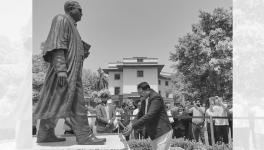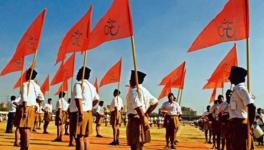Why Hindutva Loves to hate Ashoka the Great
Thousands of kings and emperors shone for a brief moment in history, then quickly disappeared. But in ‘The Outline of History: The Whole Story of Man’, H.G. Wells writes, “Ashoka shines and shines brightly like a bright star, even unto this day.” The famous British historian EH Carr also wrote, “What is history? It is a continuous process of interaction between the historian and his facts, an unending dialogue between the present and the past.”
Yet, history is a continuous ‘us versus them’ for some individuals and outfits in India. Their interaction with the past typically degenerates into a vicious monologue aimed to vitiate the present and control the future. Nowhere is their vandalism of history more visible than what the Hindutva brigade is doing to the last great Mauryan ruler, Ashoka (304-232 BCE). Often compared with a medieval Mughal ruler—whom the Hindutvadis detest and distort in equal measure—they are now transforming the Ashokan period beyond recognition into a symbol of cruelty and bigotry.
Ashoka is widely known to have filled with remorse after the tremendous bloodshed in the battle of Kalinga. After that, he is known to have devoted his life to “conquest by Dhamma or right/moral life”. It is less known that Ashoka was among the earliest rulers to launch public utilities such as hospitals, encouraged tree-plantation, dug public wells and ordered the construction of rest houses along roads. His commitment to public reason is considered phenomenal, as he, two hundred years before Christ, organised the earliest open general meetings in the world.
Yet, the Padma Shri recipient and retired bureaucrat Daya Prakash Sinha, appointed vice-president of the Indian Council for Cultural Relations during the ongoing Bharatiya Janata Party (BJP) term, who also received the Sahitya Akademi award for his play, ‘Samrat Ashoka’ in 2021, would disagree. In an interview with a national Hindi daily, he compared Ashoka with the last powerful Mughal emperor, Aurangzeb. Focusing on the pre-Kalinga part of Ashoka’s life, and mixing fact with fabrication, he presents Ashoka as a cruel, bloodthirsty bigot who harassed minorities and had intimate family members killed. As usual, the government, the BJP leadership, and its parent organisation, the RSS, looked the other way when Sinha’s views were circulated. It makes it evident that they concurred with the portrayal of Ashoka by the 83-year-old writer.
Yet the Sangh Parivar-BJP turned defensive when their ally in the Bihar government, the Janata Dal (United) decried the denigration of Ashoka, whose capital was Patliputra. It demanded revoking his Padma Shri and Sahitya Akademi award and legal action, forcing the saffron government to take damage-control steps. A prominent BJP leader from Bihar distanced his party from Sinha and registered an FIR under charges of outraging religious feelings, causing mischief in public and criminal intimidation. The charges could invite imprisonment of up to five years.
That said, there is enough evidence that the initial silence of the RSS and BJP was not inadvertent. Nobel Laureate Amartya Sen may consider Ashoka one of the greatest Indian emperors, but the Sangh Parivar has questioned his legacy many times before. An RSS-backed magazine in Rajasthan had claimed that “Ashoka’s conversion to Buddhism and his promotion of ahimsa opened India’s borders to foreign invaders”. It accused the followers of Buddhism under Ashoka of “having played a seditious role by assisting Greek invaders thinking they would destroy Vedic religion to pave the way for Buddhist dominance”.
Of late, popular writers—with scholarly-sounding books published under their name—have sought to rewrite Indian history to resonate with the Hindutva supremacist world-view. One such book is ‘The Ocean of Churn: How the Indian Ocean Shaped Human History’ by Sanjeev Sanyal, Principal Economic Advisor in the Union Ministry of Finance and popular writer. His book, raises questions on “Ashoka’s euologisation”. Echoing Sinha, this book claims Ashoka’s “early rule was brutal and unpopular” and claims he converted to Buddhism at least two years before Kalinga. He derides the view that Ashoka felt remorse after this war and says evidence suggests his conversion was more to do with the “politics of succession than with any regret he felt for sufferings of war”. For him, the Ashokan edicts found across the country, which talk about religious tolerance, were tools of “political propaganda to counter his reputation for cruelty”. Citing vague anecdotes, this author says Ashoka has “frightening parallels with modern-day fundamentalists who kill cartoonists whom they accuse of insulting their religion.”
Naturally, this pandering to prejudices in the name of history outraged serious historians. He invited criticism for ignoring historical research methodologies and the bold claims he made without evidence. Sanyal, it seems from the criticism, rarely dealt with primary sources. But it is not just that: he using popular histories, newspaper articles, etc., as the basis for his claims on history.
Perhaps we should conclude that with a Hindutva regime in power, the spread of its exclusivist world-view would continue unabated among the chattering classes. After all, what Ashoka espoused is complete anathema to them. In his 2015 book, ‘Incarnations: India in Fifty Lives’, historian Sunil Khilnani writes on Rock Edict XII, “It is a call for religious tolerance and civility in public life—or, as he puts it, ‘restraint in speech’: that is, not praising one’s own religion or condemning the religion of others without good cause…Whoever praises his own religion, due to excessive devotion, and condemns others with the thought ‘Let me glorify my own religion’ only harms his own religion. Therefore, contact between religions is good.”
Can we expect individuals or formations pursuing Hindu Rashtra, who pushed religious minorities into a secondary status and seek to inscribe this world-view in the Constitution, to respect such views? Or, would they accept that “Ashoka’s principles of justice and non-violence inspired the leaders of the freedom movement”, as the popular writer on history and social activist Ram Puniyani once wrote. Ashoka, to Puniyani, “Symbolised cultural and religious pluralism, which were central to the ideology of Gandhi and Nehru in particular.”
Remember that the formal denigration of Ashoka might be a recent affair. Yet it is the chiefly Brahmanical conservatives who first started to invisibilise him. Their counter-revolution against Buddhism began just fifty years after he died. Ashoka’s ban on killing animals for ritual purposes had made Brahmanical priests increasingly irrelevant while spreading Buddhism eroded the Varna system at its root. Ashoka’s grandson, Brihdrath, was killed by Pushyamitra Shunga, his Brahmin military chief. Dr BR Ambedkar acknowledges this in the third volume of his Writings and Speeches, “Emperor Ashoka proclaimed a complete ban on killing animals...So the Brahmans revolted against the Maurya emperor Brihadrath under the leadership of Pushyamitra Shunga, a samvedi Brahmin and the army chief of Brihadrath.”
No matter the efforts of the Brahmanical forces, the Ashokan lions still came to adorn Indian currency and the wheel of Dhamma was featured in the tricolour. Neither holds sanctity for the ideologues of the ruling dispensation, and that is why they mistrust the Ashokan legacy—not because they are keen historians.
The author is a freelance journalist. The views are personal.
Get the latest reports & analysis with people's perspective on Protests, movements & deep analytical videos, discussions of the current affairs in your Telegram app. Subscribe to NewsClick's Telegram channel & get Real-Time updates on stories, as they get published on our website.
























